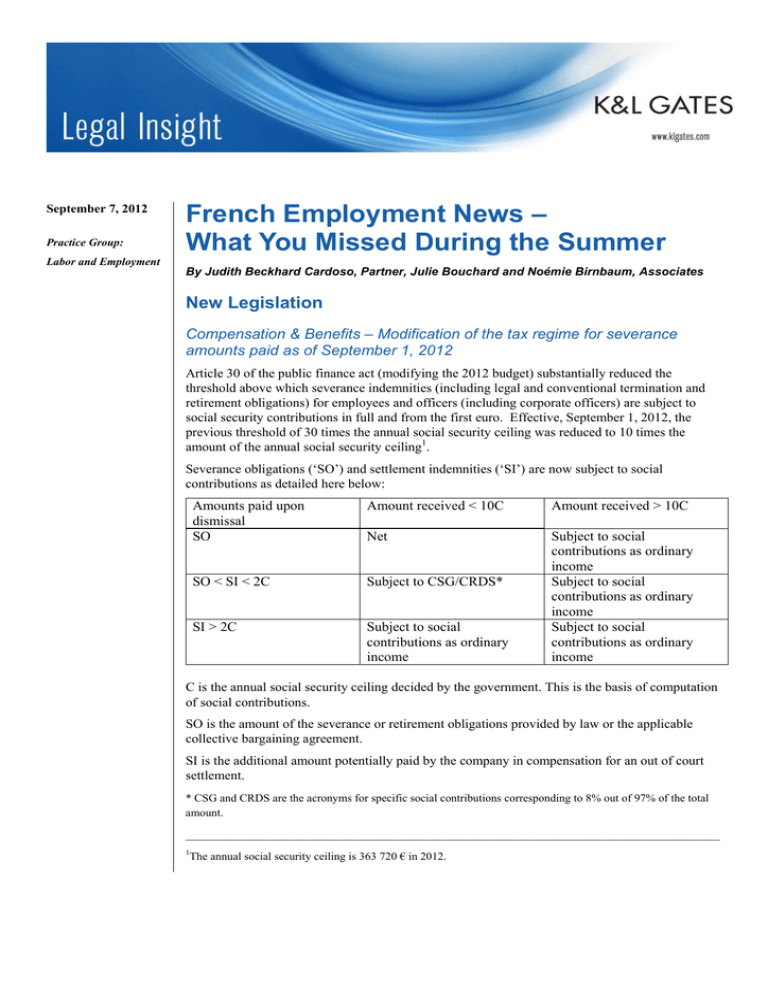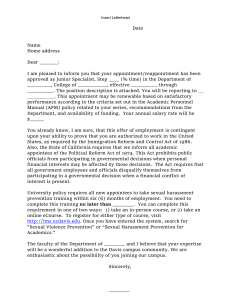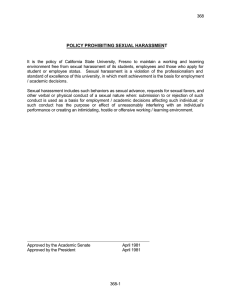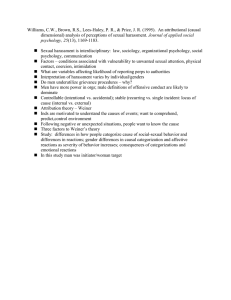French Employment News – What You Missed During the Summer New Legislation
advertisement

September 7, 2012 Practice Group: Labor and Employment French Employment News – What You Missed During the Summer By Judith Beckhard Cardoso, Partner, Julie Bouchard and Noémie Birnbaum, Associates New Legislation Compensation & Benefits – Modification of the tax regime for severance amounts paid as of September 1, 2012 Article 30 of the public finance act (modifying the 2012 budget) substantially reduced the threshold above which severance indemnities (including legal and conventional termination and retirement obligations) for employees and officers (including corporate officers) are subject to social security contributions in full and from the first euro. Effective, September 1, 2012, the previous threshold of 30 times the annual social security ceiling was reduced to 10 times the amount of the annual social security ceiling1. Severance obligations (‘SO’) and settlement indemnities (‘SI’) are now subject to social contributions as detailed here below: Amounts paid upon dismissal SO Amount received < 10C Amount received > 10C Net SO < SI < 2C Subject to CSG/CRDS* SI > 2C Subject to social contributions as ordinary income Subject to social contributions as ordinary income Subject to social contributions as ordinary income Subject to social contributions as ordinary income C is the annual social security ceiling decided by the government. This is the basis of computation of social contributions. SO is the amount of the severance or retirement obligations provided by law or the applicable collective bargaining agreement. SI is the additional amount potentially paid by the company in compensation for an out of court settlement. * CSG and CRDS are the acronyms for specific social contributions corresponding to 8% out of 97% of the total amount. _______________________________________________________________________________ 1 The annual social security ceiling is 363 720 € in 2012. French Employment News – What You Missed During the Summer Increase of employers’ and employees’ shares of social contributions on free shares and stock-options for employers and for employees as of July 2012. Article 31 of the public finance act increased the social contributions required on free shares and stock-options. Effective July 11, 2012, the act increased the employers’ share of social contributions from 14% to 30% and eliminated the special exception or dispensation for free shares under a certain amount. Effective July 18, 2012, the employees’ and officers’ share of social contributions increased from 8% to 10%. Doubling the rate of the employers’ specific contribution on defined benefit retirement plans (called ‘top hat plans’) as of December 31, 2012. As of December 31, 2012, employers’ contribution rates for top hat plans will increase: from 12% to 24% on premiums (in case of externalized management of the funds); from 24% to 48% on allocations to provisions or amounts mentioned in appendixes to the balance sheet (in case of internalized management of the funds); and from 16% to 32% on annuities realized as from January 1, 2013. Article 33 of the public finance act increased the rate of the Social Security Fee (forfait social) on compensation or capital gains from 8% to 20% as of August 1, 2012. However, the rate for employers’ contributions aimed at financing complementary welfare schemes to employees, former employees and their beneficiaries as well as the amounts dedicated to the special profit sharing reserve within certain companies (sociétés coopératives ouvrières de production) remains at 8%. Employment law – A new legal frame for sexual harassment and sexual discrimination The French Supreme Court abolished the existing provisions regarding sexual harassment in June 2012 because they did not comply with the French constitution’s requirement of a detailed definition of criminal incriminations. A law dated August 6, 2012, provides a definition for sexual harassment and increases the criminal sanctions that existed under the previous law. Definition: Under the new law, sexual harassment is defined as “the fact to, repeatedly, impose on someone, behaviors or comments with a sexual connotation, which offend this individual’s dignity, either due to their humiliating or demeaning nature, or to the fact that they create towards this person an intimidating, hostile or offensive situation, or the use, even if not repeated, of any serious pressure in order to actually or supposedly obtain a sexual act, in favor of the author of such facts or in favor of a third party.” Increased criminal sanctions2: Sexual harassment can result in sanctions of 2 years of imprisonment and a €30,000 fine. The new law requires employers to post the definition of sexual harassment “in the facilities or at the door of the facilities where the employees are hired, in addition to the place of work.” The act also creates two new offences: discrimination further to the whistle blowing on facts of sexual harassment (sanctioned by 3 years of imprisonment and a €45 000 fine) and discrimination based on sexual identity (probably aimed at transgender discrimination). _____________________________________________________________________________ 2 This criminal sanction also applies to mental harassment. 2 French Employment News – What You Missed During the Summer Summer Precedents Employee privacy – French Supreme Court departs from famous ‘Nikon’3 rule and decides that an employee must identify each document or email claimed to be private, in order to preserve such data privacy. An employee’s global identification of the hard drive of his or her professional or work computer as personal or private does not change the professional nature of the information included on that hard drive. Such global identification thus does not prevent the employer from freely accessing the employee’s files and folders included on that hard drive4. Mails from an employee, addressed or received on the place of work, and which are not identified as private or personal, can be freely opened and consulted by the employer5. An employer has the right to read and consult any and all paper documents and folders left in the office of an employee located on the company premises as long as such documents and folders have not been identified as private or personal6. Annual leave – French Supreme Court departs from previous ruling on burden of evidence in case of annual leave. It is now up to the employer to demonstrate that it enabled an employee to take his or her annual leave7. In order to demonstrate that the employer complied with its obligation in terms of annual leave, the employer shall now demonstrate that it: informed the employees of the annual leave period at least 2 months before such period; informed each employee individually of the priority of annual leave one month before the employee’s departure; and posted the priority of the annual leave in a place which is usually accessible to employees. _______________________________________________________________________________ 3 The Nikon case dated May 14, 1997 is the jurisprudential cornerstone of a legal construct which provides that as every French employee knows, he or she is entitled “while in the workplace, during working hours, to the right to privacy. This specifically implies the secrecy of correspondence. Thus, an employer may not, without infringing this fundamental freedom, read any personal messages sent or received by the employee using a computer tool made available to the employee for his work, even when the employer has prohibited such non work-related use of the computer”. 4 Cass. soc. 4 July 2012 n° 11-12.502 (n° 1831 F-D), Libert c/ Sté Nationale des chemins de fer français 5 Cass. soc. 11 July 2012 n° 11-22.972 (n° 1942 F-D), Regnault c/ Sté Poiray joaillier 6 Cass. soc. 4 July 2012 n° 11-12.330 (n° 1830 F-D), Tellier c/ Sté SNCF 7 Cass. soc. 13 June 2012 n° 11-10.929 (n° 1518 FS-PBR), Barthelemy c/ Sté Médiapost 3 French Employment News – What You Missed During the Summer Authors: Judith Beckhard Cardoso judith.beckhardcardoso@klgates.com +33.1.58.44.15.15 Julie Bouchard julie.bouchard@klgates.com +33.1.58.44.15.10 Noémie Birnbaum noémie.birnbaum@klgates.com +33.1.58.44.15.36 4





